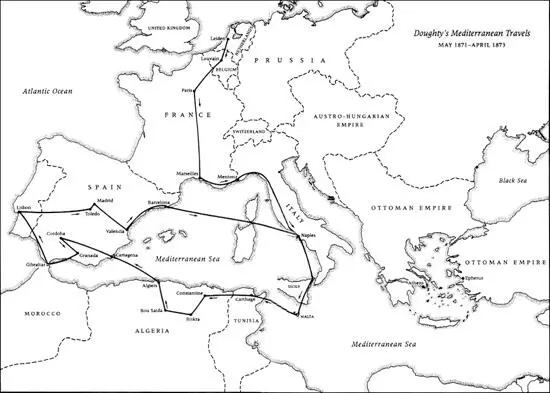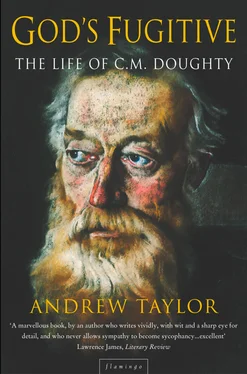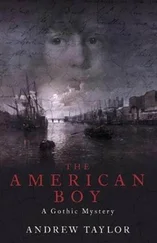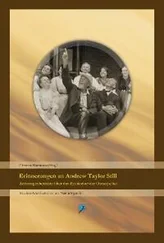‘We were in totally different parts of Arabia, so he couldn’t give me any information about the country itself, but he could give me a feel for the bedu and their way of life,’ said Thesiger, whose own book, Arabian Sands , is itself considered a classic. 4 ‘It was a massive undertaking. Thomas’s books I don’t think are worth reading; Philby’s are too technical, and I don’t find them readable, but there is more in Doughty about the Arabs and their way of life than anywhere else.’
Doughty claimed later that his travelling was no more than a brief distraction in a life dedicated to poetry. But Arabia stayed with him until the day he died – as indeed it did with all the explorers. His obsessions, though, were bigger, more ambitious, than theirs – his book delving at the same time into the soul of a civilization and into the soul of a single tortured human being.
He was born into the maelstrom of the most wide-ranging revolution in the entire history of western thought, and he shared fully in an intellectual upheaval that still reverberates. Scientific disputes are usually remote, abstruse – the bitter argument centuries before, over whether the sun or the earth was at the centre of the universe, had been carried on largely among a small group of committed experts. The vast mass of the people were as unaffected as they were uncomprehending. But the twin shocks of the revolution which hit the mid nineteenth century were to shake the confident world-view of virtually every single thinking person in the western world for decades to come.
Through the early years of the century generations of comfortable certainty were being chipped away by the questing hammers of the new geologists. Not only was the world vastly older than the theologians suggested, the scientists claimed, but the natural forces that had shaped it were still at work. Two books took the argument forward – first Charles Lyell’s Principles of Geology , and then Charles Darwin’s On the Origin of Species .
Each was the synthesis of a dispute which had been simmering for decades, but they shifted the ground of the debate irreversibly. First the earth, and now mankind itself, was toppled from its position as the unchanging Creation of a loving God. The reassuring vision of man in the image of his Maker was altered for ever. It was by going to study the work of wind, rain, volcanoes and glaciers, peering through microscopes rather than poring over religious books, that knowledge could be won.
Doughty followed both courses. He was born into a family which, through its generations of conservative Anglican religious ministry and its respect for history and tradition, was likely to be shaken to the core by the revolution. Many people in a similar position struggled to maintain their equanimity by ignoring the scientific arguments, others by relinquishing their religious faith. Doughty, picking over fossils in the Suffolk clay, travelling to Cambridge University to study the dangerous new discipline of Natural Science, struggling with his ice-axe and notebooks over the glaciers of Norway, yet still maintaining his passionate religious sense, was caught in a lifelong dilemma.
After Cambridge, he abandoned science to turn to poetry, abandoned the new fascination with field-study to return to the library. Once again, he was delving back into the past, into the foundations and origins this time of language and literature, a self-taught philologist, linguist and anthropologist. When he set off on his travels, his copies of Chaucer, Spenser and other early English writers in his bags, it was with a closely drawn and wide-ranging intellectual map which could guide his researches in geography, geology, biology, history, anthropology and language.
But he had, too, the deeply introspective determination of a writer and a poet. His wanderings, as far as we can tell, seem to have been largely serendipitous: Doughty was blown by whatever wind took him, first around Europe, then through the Middle East and Sinai, and finally south with the Hadj caravan towards Mecca.
When he returned, it was to a life of unremitting study and contemplation as he embarked first on the story of his travels, and then on a series of epic poems that drew on his experiences, his researches and his uncompromising belief in the corruption and decadence of the English language. He saw himself as a patriot, trying to turn back the clock to a time when language and literature were fresh and pure. He failed, as people who reach back into history always do; but the attempt dominated his life, and the poetry that it created does not deserve merely to be forgotten.
In many ways, he was a man of his times: he felt a Victorian’s distaste for industrialization; he joined in the brutal, blustering patriotism of the First World War years; even his fascination with language, with the words and expressions of another age, was shared by other scholars and poets of the period. But, a sort of intellectual Howard Hughes, he read nothing of their work, and virtually nothing of other contemporary writing: the names of the leading poets and writers of his day were completely foreign to him, and he shied nervously away from the onrush of the twentieth century.
He was indeed, in the phrase he was to use many years later, ‘God’s Fugitive’.

There is nothing in the nature of a biography; nor could there, that I can see, be any utility in it. I was born in ’43 and left an orphan when a little child. I am now rather an invalid …
Letter to S. C. Cockerell, Christmas Day 1918
The solid, square flint tower of St Mary’s Church, Martlesham, is almost hidden among the Suffolk trees. It stands a couple of miles away from the modern village – easy to miss for the casual visitor.
Inside are the haphazard treasures of thousands of English country churches: a fifteenth-century wall painting of St Christopher, lovingly preserved; an ancient family pew recessed into a wall of the chancel, and now used to store cleaning materials; a stone font from the fifteenth century and a carved oak pulpit from the seventeenth; an ancient chest, and a few pieces of medieval stained glass gathered into a single panel. And along the walls, the carved memorials that say everything and nothing about the long-dead members of a local family – in this case, the Doughtys.
There are George Doughty, died 1798, and his wife Ann; their son Chester, who died in 1802; Major Ernest Christie Doughty, DSO, of the Suffolk Regiment, who died in 1928; his grandfather, Frederic Ernest, Rector of Martlesham for nearly thirty years. Outside, more Doughtys are at rest in the graveyard: Rear-Admiral Frederick Proby Doughty, who died in 1892, and his wife, the former Mary Arnold, with their child Beatrice May, lie there among their relatives.
Of Charles Montagu Doughty, for whom as a child Martlesham was closer to being a home than anywhere else, there is nothing: his memorial is far away, in a London crematorium. And yet the atmosphere of the simple little church, its unimpeachable, unassuming Englishness and its dignified reserve, reflect one facet of his character. As in churches all over the country, it is the list as a whole, rather than the individual names, which tells the story; of specific characters, particular lives, the memorials are all but silent. There are names, dates, an occasional mention of a life’s work, but it is the tradition, the history, not the individual, which counts.
And that, without the slightest doubt, is what Charles Doughty would have thought the proper attitude.
Читать дальше













